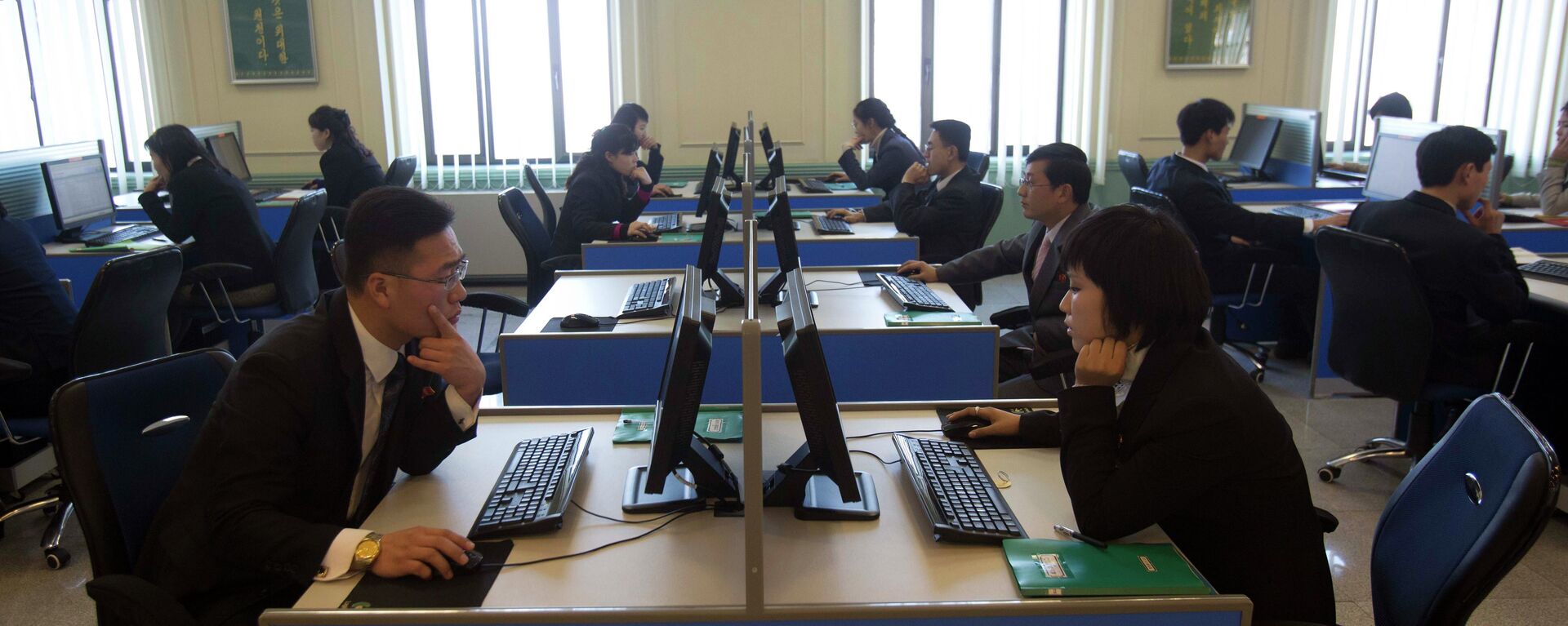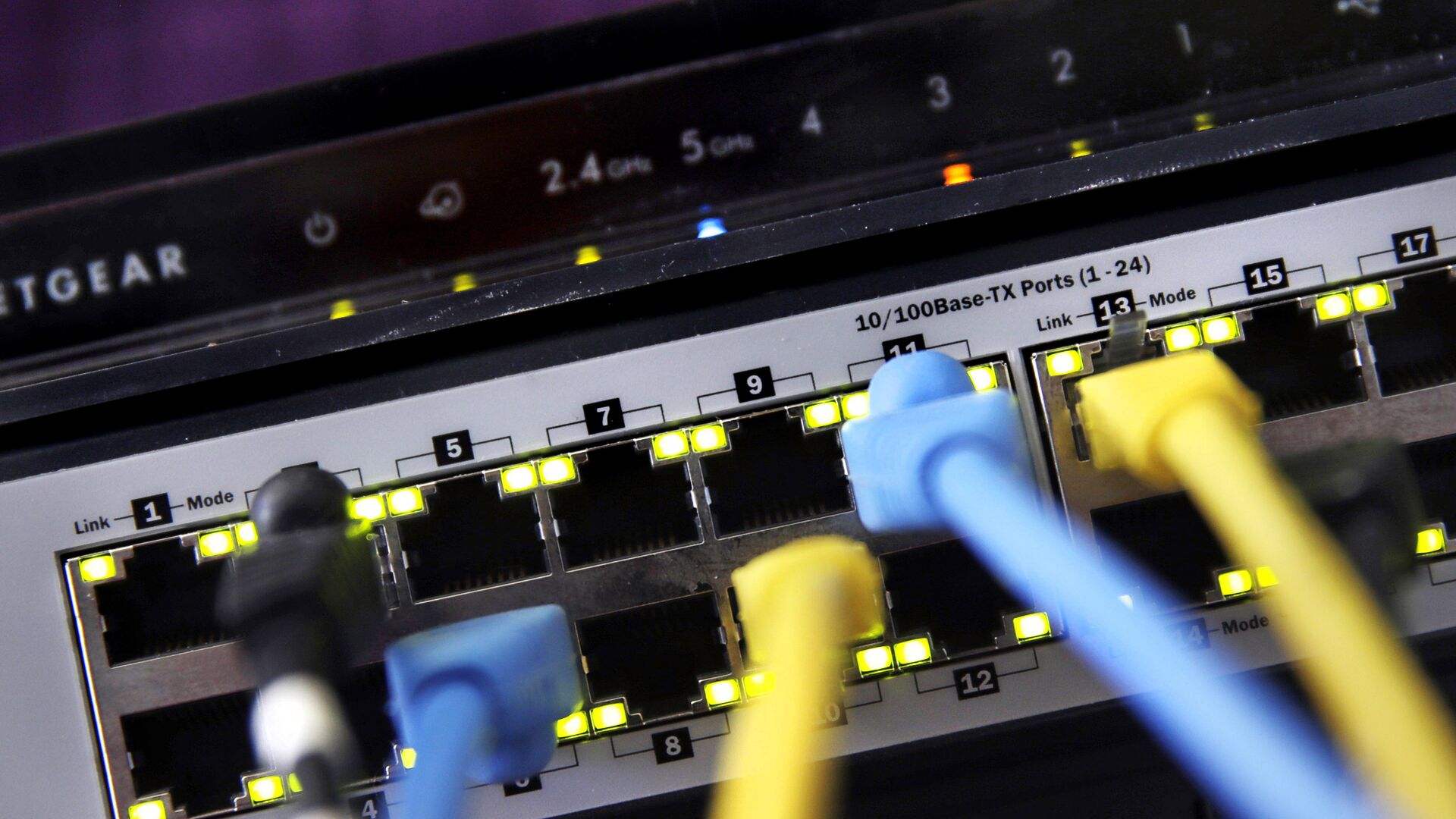https://sputnikglobe.com/20230228/report-governments-are-shutting-down-the-internet-more-than-ever-1107883524.html
Report: Governments Are Shutting Down the Internet More Than Ever
Report: Governments Are Shutting Down the Internet More Than Ever
Sputnik International
Governments are using internet shutdowns to quell dissent and ahead of elections, school exams, or to prevent the spread of what they say is "misinformation."
2023-02-28T22:57+0000
2023-02-28T22:57+0000
2023-02-28T22:57+0000
world
internet censorship
internet
shutdown
india
myanmar
https://cdn1.img.sputnikglobe.com/img/107053/91/1070539103_0:177:3857:2347_1920x0_80_0_0_1bd997805e936fd334726f25ec245098.jpg
According to Access Now’s annual KeepItOn report, governments across the world are shutting down the internet more than ever, often in an attempt to squash dissent, limit discussions of controversial subjects, during elections, or as part of a broader strategy to damage infrastructure during military conflicts.The report states that 167 internet shutdowns occurred in 2022, compared to 112 in 2021, 99 in 2020 and 75 in 2019. The leading country, as it has been for the past five years, is India, with 84 shutdowns this year. But other governments are also increasingly using the practice. 2022 marked the first year since tracking started in 2016 that the number of shutdowns outside of India topped 100.Some of the internet shutdowns, 28, included in the report are shutdowns of specific services, like social media sites, and not the entire internet.Many of India’s shutdowns occurred in the Jammu and Kashmir regions, intended to squash protests and unrest in the region. The government has also, according to the report, refused to end shutdowns after being ordered to by the country’s Supreme Court.They are not alone, there were 62 shutdowns that Access Now says were done to quell unrest in areas, the longest coming from Myanmar which has the longest ongoing shutdown, set to exceed 540 days in March. Sixteen of the shutdowns in 2022 were carried over from 2021 and another 16, including the aforementioned Myanmar shutdown that began in 2021, carried over into 2023.One surprising trigger for internet shutdowns is school exams. Authorities implemented eight shutdowns in an attempt to prevent cheating during school exams, including four cases that shut off the internet for the entire country (Algeria, Jordan, Sudan and Syria) and four cases that shut down the internet in three specific regions (Kurdistan in Iraq and Assam and West Bengal in India.)Internet shutdowns do not just affect the protesters or students the government is targeting, but usually affect large swaths of the population indiscriminately, affecting the economy, tourism and daily life.“I saved enough money to buy myself a smartphone, and started working as a delivery agent to provide for my family. My income depends on the internet. When the internet is shut down for days on end, I don’t make a single rupee,” a food delivery driver from Shillong, Meghalaya, India is quoted as saying in the report.The majority of shutdowns were intended to squash dissent and that has made it more difficult for activists and dissidents to fight back against oppressive regimes. “In some places, we can only communicate over military-owned telecom operators’ networks, even when we know it is very risky,” a person described in the report as a “human rights defender” in Myanmar said.While most shutdowns affect the entire population of an area in some way, oftentimes governments target mobile networks specifically to allow wired broadband access to continue. Access Now says this creates a digital divide in poorer countries where only the wealthy elite and some businesses have access to wired internet and the vast majority of activists and lower-class people rely on mobile networks for communications.There have been some technological attempts to enable internet access that cannot be easily shut down by the authorities. Of these technologies, mesh networks show the most promise. Rather than relying on a cellular network, mesh network devices act as “nodes” passing on information to other devices in that network. With small and cheap enough devices, activists could hide them around an entire city, creating an intranet that would allow communication to continue within the city. If one or more of the devices could connect to a router with an internet connection, it could also act as a waypoint for the rest of the devices and open up the entirety of the internet for devices on the network.But mesh networks have hurdles that must first be overcome to become a viable solution. While devices can be built fairly cheaply, what is cheap in the United States may be harder to obtain in developing or war-torn countries. There is also the issue of trust. If the devices are easily made and reproducible, then it would be trivial for governments to add a few nodes of their own to the network and monitor communications.The technology also isn’t that popular in most regions that have the capital to bootstrap the project. Most populations in so-called 'first world' countries aren’t commonly subjected to government shutdowns and so their populations don't see the need for mesh network devices they may never use. This lack of investment limits the technology’s ability to scale.In 2021, Vice Motherboard wrote an article profiling activists who were working on easily deployable mesh network devices that could be made with off-the-shelf products, but the project’s website is down and its GitLab page hasn’t been updated in two years.If the governments of those countries do decide to implement shutdowns, it may already be too late to spread information about the mesh networks and get them running.While the United States did not shut down the internet in 2023 according to the report, Its government is not above shutting down the internet. In 2011, the Bay Area Rapid Transit System (BART) shuttered its underground wireless network while dealing with protests that erupted after a police shooting, and in 2016 activists at Standing Rock claimed their cellphone signals would mysteriously disappear, interrupting livestreams that were showing police actions against protesters.Still, there are other mesh network projects ongoing, and projects like NYC Mesh not only have been used to provide internet for protesters, the company uses the technology to offer cheaper alternatives to traditional internet service providers.Of course, mesh networks would largely be unnecessary if governments simply stopped shutting down the internet, something Access Now suggests they do. “Commit in law, policy, and practice to #KeepItOn at all times, and encourage other states to do the same,” the report suggests.
https://sputnikglobe.com/20210215/internet-access-restored-in-protest-hit-myanmar-after-shutdown-watchdog-says-1082078723.html
https://sputnikglobe.com/20141223/1016140523.html
myanmar
Sputnik International
feedback@sputniknews.com
+74956456601
MIA „Rosiya Segodnya“
2023
News
en_EN
Sputnik International
feedback@sputniknews.com
+74956456601
MIA „Rosiya Segodnya“
Sputnik International
feedback@sputniknews.com
+74956456601
MIA „Rosiya Segodnya“
internet shutdown, mesh networks, india internet shutdown, myanmar, jammu, kashmir internet, censorship
internet shutdown, mesh networks, india internet shutdown, myanmar, jammu, kashmir internet, censorship
Report: Governments Are Shutting Down the Internet More Than Ever
Governments are using internet shutdowns to quell dissent and ahead of elections, school exams, or to prevent the spread of what they say is "misinformation."
According to Access Now’s annual
KeepItOn report, governments across the world are shutting down the internet more than ever, often in an attempt to squash dissent, limit discussions of controversial subjects, during elections, or as part of a broader strategy to damage infrastructure during military conflicts.
The report states that 167 internet shutdowns occurred in 2022, compared to 112 in 2021, 99 in 2020 and 75 in 2019. The leading country, as it has been for the past five years, is India, with 84 shutdowns this year. But other governments are also increasingly using the practice. 2022 marked the first year since tracking started in 2016 that the number of shutdowns outside of India topped 100.
Some of the internet shutdowns, 28, included in the report are shutdowns of specific services, like social media sites, and not the entire internet.
Many of India’s shutdowns occurred in the Jammu and Kashmir regions, intended to squash protests and unrest in the region. The government has also, according to the report, refused to end shutdowns after being ordered to by the country’s Supreme Court.
They are not alone, there were 62 shutdowns that Access Now says were done to quell unrest in areas, the longest coming from Myanmar which has the longest ongoing shutdown, set to exceed 540 days in March. Sixteen of the shutdowns in 2022 were carried over from 2021 and another 16, including the aforementioned Myanmar shutdown that began in 2021, carried over into 2023.

15 February 2021, 05:45 GMT
One surprising trigger for internet shutdowns is school exams. Authorities implemented eight shutdowns in an attempt to prevent cheating during school exams, including four cases that shut off the internet for the entire country (Algeria, Jordan, Sudan and Syria) and four cases that shut down the internet in three specific regions (Kurdistan in Iraq and Assam and West Bengal in India.)
Internet shutdowns do not just affect the protesters or students the government is targeting, but usually affect large swaths of the population indiscriminately, affecting the economy, tourism and daily life.
“I saved enough money to buy myself a smartphone, and started working as a delivery agent to provide for my family. My income depends on the internet. When the internet is shut down for days on end, I don’t make a single rupee,” a food delivery driver from Shillong, Meghalaya, India is quoted as saying in the report.
“With repeated shutdowns, tourism, the mainstay of our economy, is taking a hit. We can never say how long a communication blackout will last. Tourists become stranded, unable to communicate with loved ones, as basic messaging, navigation, and mobility services all become unavailable.”
The majority of shutdowns were intended to squash dissent and that has made it more difficult for activists and dissidents to fight back against oppressive regimes. “In some places, we can only communicate over military-owned telecom operators’ networks, even when we know it is very risky,” a person described in the report as a “human rights defender” in Myanmar said.
“Many times, we have to communicate with intermediaries for people’s safety, so we struggle to get direct information. Everything we do is being monitored — the military is conducting house raids, freezing our bank accounts and mobile banking apps, monitoring financial transactions, tracking SIM cards and phone IMEIs, stopping the issuance of passports to control people flying in and out.”
While most shutdowns affect the entire population of an area in some way, oftentimes governments target mobile networks specifically to allow wired broadband access to continue. Access Now says this creates a digital divide in poorer countries where only the wealthy elite and some businesses have access to wired internet and the vast majority of activists and lower-class people rely on mobile networks for communications.
There have been some technological attempts to enable internet access that cannot be easily shut down by the authorities. Of these technologies, mesh networks show the most promise.
Rather than relying on a cellular network, mesh network devices act as “nodes” passing on information to other devices in that network. With small and cheap enough devices, activists could hide them around an entire city, creating an intranet that would allow communication to continue within the city. If one or more of the devices could connect to a router with an internet connection, it could also act as a waypoint for the rest of the devices and open up the entirety of the internet for devices on the network.
But mesh networks have hurdles that must first be overcome to become a viable solution. While devices can be built fairly cheaply, what is cheap in the United States may be harder to obtain in developing or war-torn countries. There is also the issue of trust. If the devices are easily made and reproducible, then it would be trivial for governments to add a few nodes of their own to the network and monitor communications.
The technology also isn’t that popular in most regions that have the capital to bootstrap the project. Most populations in so-called 'first world' countries aren’t commonly subjected to government shutdowns and so their populations don't see the need for mesh network devices they may never use. This lack of investment limits the technology’s ability to scale.

23 December 2014, 09:49 GMT
In 2021, Vice Motherboard wrote an article profiling activists who were working on easily deployable mesh network devices that could be made with off-the-shelf products, but the project’s website is down and its GitLab page hasn’t been updated in two years. If the governments of those countries do decide to implement shutdowns, it may already be too late to spread information about the mesh networks and get them running.
While the United States did not shut down the internet in 2023 according to the report, Its government is not above shutting down the internet.
In 2011, the Bay Area Rapid Transit System (BART) shuttered its underground wireless network while dealing with protests that erupted after a police shooting, and in 2016 activists at Standing Rock
claimed their cellphone signals would mysteriously disappear, interrupting livestreams that were showing police actions against protesters.
Still, there are other mesh network projects ongoing, and projects like NYC Mesh not only have been used to provide internet for protesters, the company uses the technology to offer cheaper alternatives to traditional internet service providers.
Of course, mesh networks would largely be unnecessary if governments simply stopped shutting down the internet, something Access Now suggests they do. “Commit in law, policy, and practice to #KeepItOn at all times, and encourage other states to do the same,” the report suggests.






